Meg Harris has worked hard at her sport for years, collecting medals and world records along the way. Now – as she builds towards what is being touted the toughest-ever Olympic qualifying trial – she discusses her challenges, motivations, and goals for Paris.
Poolside, Birmingham Commonwealth Games, 2022.
A reporter asks freestyler Meg Harris a question about her teammate Emma McKeon.
Harris, hair still wet from her 50m finals swim, smiles broadly and leans into the microphone.
“I’m really happy with how my race went,” she says. She looks at the reporter’s face, and realises she has made a rare misstep. Or rather, a misread. Usually, the Olympic gold medallist (4x100m freestyle, Tokyo Games) can lip-read any question the media throws at her.
Either that, or one of her teammates will repeat the question to her discreetly, or even answer the question for her. This time, however, she’s alone on the deck, the crowd is noisier than usual, and she has relied too much on the question being a version of the one swimmers are often asked post-swim: How do you think you swam?/Are you happy with that time?/How did that swim feel for you?
Today, Harris, 22, relaxed and in a tracksuit after an intense gym workout, laughs at the gaffe. “They’re pretty similar questions when you get out, so I can kind of make it out – not that time though.”
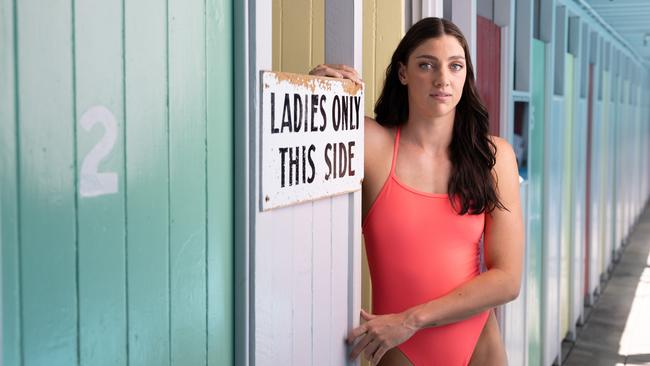
There’s always going to be someone... who’s willing to help you get to where you want to be.”
She laughs again, this remarkable young woman who has hearing loss in both ears, and is about to face what sports commentators are calling the toughest ever Olympic qualifying trial – in any sport.
Vying for one of just two places in the Paris Olympics 100m freestyle are a line-up of women who have won either Olympic or world titles or medals in the event. Harris is up against McKeon, Mollie O’Callaghan, Cate Campbell, Bronte Campbell and Shayna Jack in what is shaping up to be the hottest trial ticket in town.
So talented is this field, and so impressive are each swimmer’s current times for it, the word is that whoever makes the top two, is almost guaranteed a medal in Paris, vagaries of swimming aside.
And Harris, who has flown somewhat under the radar compared with marquee swimmers such as McKeon and O’Callaghan, could just be the dark horse in the field.
At Brisbane’s Metropolitan Championships in March, Harris – who swims with Brisbane’s Rackley Swim Team, under Damien Jones – won the 100m freestyle in 53.17, edging out Cate Campbell for the top spot and breaking Campbell’s event record. It was a spectacular swim from Harris, who has never let her lack of hearing stop her from making a splash, in or out of the water.
After all, as she says with a grin, you don’t need to hear to swim.
Harris has always been a water baby. Either playing Marco Polo in backyard pools, training at swim schools, or surging into the surf as a nipper, then a junior lifesaver, she has spent much of her life with either salt or chlorine on her skin.
Growing up in North Queensland, with her father Darren (known as Harry – “long story”), a truss and frame designer, her mother Angela, a swimming teacher, and her sister Bella, 24 and about to leave for London to work as a nanny, Harris’s swimming career began in Mackay.
Nestled on the Coral Sea coast, Mackay is 970km north of Brisbane and known as the sugar capital of the state. It’s also known for batting above its weight when it comes to producing world-class swimmers, with Madame Butterfly Susie O’Neill, Geoff Huegill and Linda Mackenzie hailing from the region.
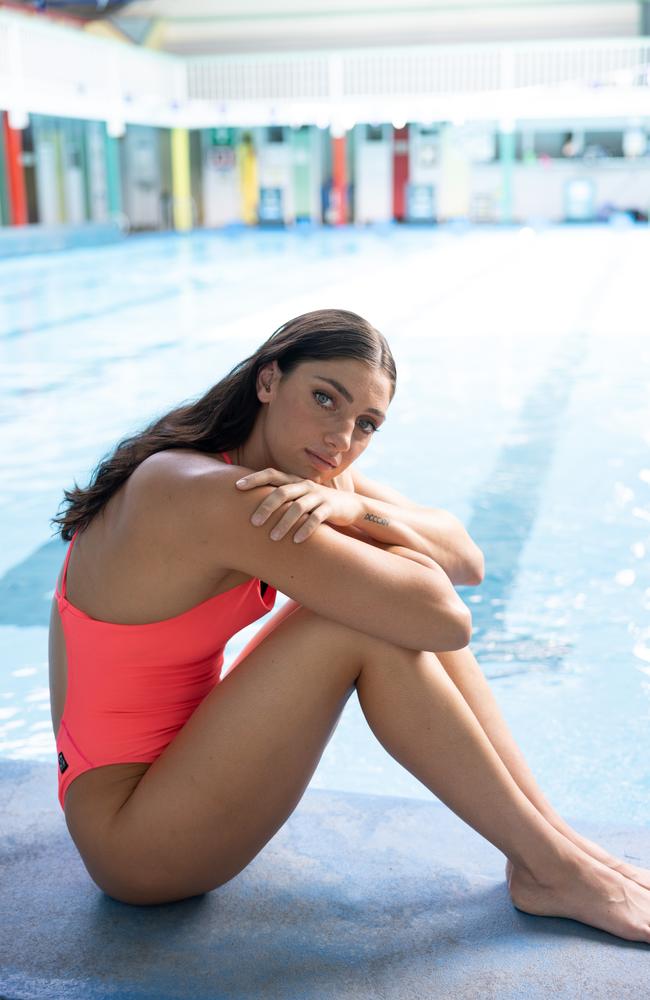
“It was a great place to grow up,” Harris reflects. “Pretty much everyone knew everyone else, and because my parents were involved in surf lifesaving, it was a big part of our lives. We learnt to swim at a young age to make sure we could be safe in the surf, and on weekends we’d be at the surf club. You’d do your events in the morning, and then everyone would stay for their sausage and bread, and all the parents would be socialising, the kids would just hang out and play” – Harris smiles, remembering those free- range days of sand dunes and barbecues.
When she was 13, the family moved to Brisbane. She had already dipped her toe in the waters of competitive swimming in Mackay but was always torn between the red and yellow flags of lifesaving, and the long, black line of the swimming pool. The move to Brisbane, she says, meant swimming won. But accustomed to being a big fish in a small pond, Harris says she struggled when that flipped around.
Harris joined the Commercial swimming club, based at Fortitude Valley, under coach Michael Bromley. The Campbell sisters were also training at Commercial, under its high- performance coach Simon Cusack. Harris remembers the thrill of seeing the swimming sisters training at the same pool.
“It was pretty exciting,” she smiles. “I won my first race there as well. It was the School States, and I had spent all week not winning any of my events, and it was looking like I would not make the team. I just really needed to get on the wall, and in the last race of the day, it was the 50 freestyle, I won. All I remember was looking in the stands for my parents’ faces, all I wanted to do was to see them, and I knew they were there somewhere.”
Harris’s parents have always been there, her biggest cheerleaders in a swimming career that has had its challenges, Harris candidly admitting that she struggled with her commitment during her last year of high school.
I felt like I was missing out on so much, all my friends were just starting to learn about life after school.”
Attending Mt St Michael’s College, in Brisbane’s leafy northern suburb of Ashgrove, but training at St Peters Lutheran College in Indooroopilly, in Brisbane’s west, meant early mornings to make the trek across town. Harris moved to St Peters in 2019 to be coached by Dean Boxall (he of the now famous, exuberant, post-swim celebration after Ariarne Titmus took gold in Tokyo). Under Boxall’s watch, she made the Junior World Championships while juggling the demands of senior high school.
“Usually if you train at St Peters, you have to also go to school there, but because I had great support at Mt St Michael around my hearing, I was allowed to stay there. At St Peters, you swim right up to school time, and to get there, it was a really early start,” she laughs. “But I began to struggle. I felt like I was missing out on so much, all my friends were just starting to learn about life after school and I remember all I wanted to do was to have one spontaneous trip.”
She graduated in 2019, which means the next year, 2020, no one was going anywhere, least of all on daytime jaunts to the beach.
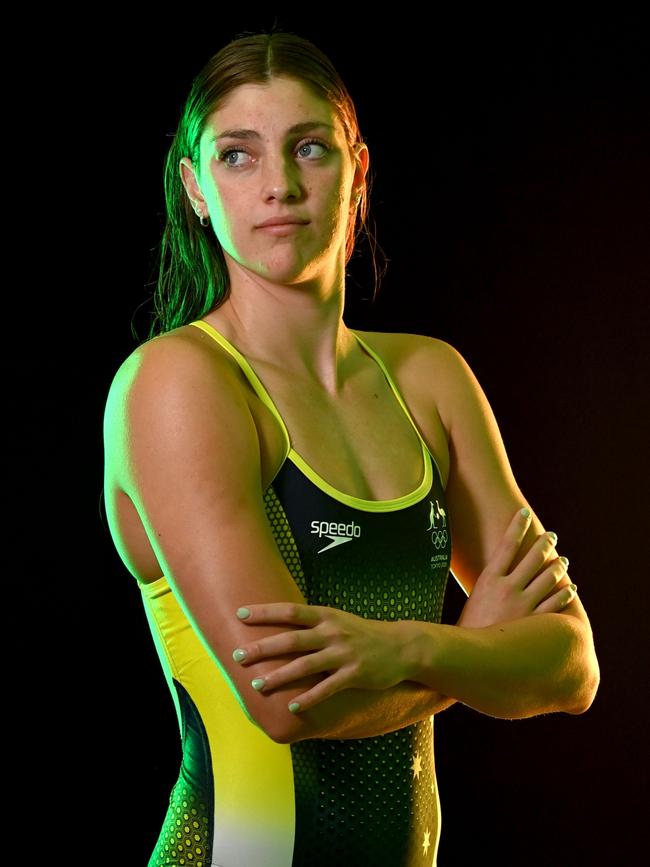

“Everything just stopped, we weren’t sure when the Olympics were happening, or if they were going to be cancelled. At first, we had training programs to do at home, and during that time I thought ‘I don’t want to do it anymore. I want to know what it’s like to sleep in, I want to know what it’s like to be a normal 18 year old’.
“Then we returned to the pool, but it was just a couple of mornings a week, so I started enjoying myself, going out on weekends with my friends, just hanging out. After a couple of months we had the state titles, and I got in the water, and swam a personal best. It was the best experience, I felt great in the water, better than I had for so long – and I think that’s when I fell in love with sport again.”
And, having tested if the grass really was greener on the other side, Harris discovered she preferred the pool’s blue hue. “I think I just needed to know what I was missing out on, but it made me realise the thing I was really missing was swimming.”
Harris went to Boxall and told him: “I want this. I want to do this. I want to do more of this training, I want to give it everything I’ve got.”
Boxall was on board and, she adds: “I just started improving.” She did so to the tune of shaving off 10 seconds (which, in swim time, is like shaving off a decade) in her 200m freestyle, and earning herself a place on that Australian 100m relay for the Tokyo Olympics, which went ahead a year late, masks and all.
So here we are at that marshalling area. The 2020 Tokyo Olympics, in August 2021.
Harris, McKeon, Bronte and Cate Campbell gather, holding hands. Harris at 19 is the youngest of the group, she is making her Olympic debut, and she is, she remembers, a bundle of nerves. It’s not her teammates’ first rodeo, all three having competed at an Olympics before. McKeon addresses the group.
“She said ‘Nothing you can do in the next five minutes before we go out there is going to change anything. Nothing is going to change the way we swim, or the outcome. Unless one of us breaks an arm on the way, nothing changes.”
So they went out and did it how they had practised for what seemed like a million times.
With perfect timing, precision, pace, keeping to the race plan. Bronte Campbell first, then Harris, McKeon, and lastly, Cate Campbell. Not only did they win, they finished the race in 3:29.69, a world record. Harris’s second leg at 53.09 seconds gave the team a convincing lead, which they never yielded.
“I think it was Cate who told me we had the world record,” Harris laughs. “I didn’t even know we’d done it.”
Harris was then a member of the team that set a new world record in the event (3:27.96) last year. Whether they do it again at the Paris Olympics – or indeed who does it – depends on the upcoming Olympic trials.
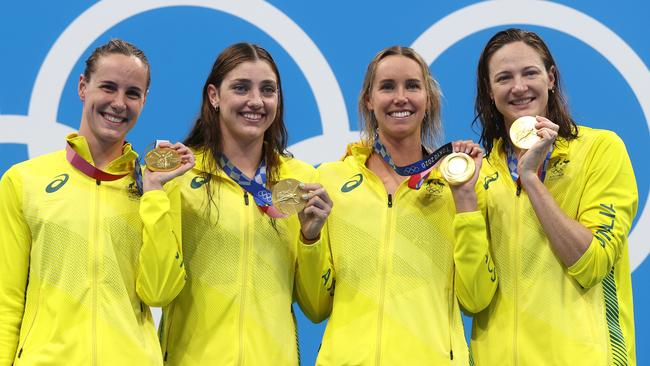
But whatever happens at the Brisbane Aquatic Centre from June 10-15 – the only selection meet for a place on the Australian Dolphins team for Paris – Harris will have her family cheering her on. At the meet, she hopes to gain a place in the 50m and 100m freestyle, and the 4x100m relay, or all, if things go her way. Harris has put in the work, having returned home to Brisbane after a two-year stay in Adelaide, training under Peter Bishop, at the elite South Australian Sports Institute.
“I wanted to go because I wanted to prove to myself I could be fully independent, live by myself, cook by myself and be by myself. I did get my first individual international medals at the Worlds (junior championships in Budapest, 2019) but I felt like I needed my support group around me leading up to Paris.
“I used to worry a bit that people were like ‘oh, she’s moved again’, ‘oh, she’s got another coach’. It hits me pretty hard when I read that, the media can be pretty brutal, but I’m so glad I came back, it’s been great.”
Harris is a great communicator – a good talker and listener. She uses a combination of hearing aids and lip reading, and never misses a beat. After all, she’s been doing it all her life …

Very commonly I don’t hear the whistle to get on the blocks, because everyone is talking.”
“When I was in grade one, they had the tests that come to school and they do your eyesight, your hearing … they give you the button to push when you hear a sound. You are meant to click the button and I remember just sitting there, waiting. And they said “all right”, and I was like, “oh, are we ready to start”. They said no, we’re done, and I hadn’t pressed the button, and they were like “aah”. What followed that “aah” for Harris was more tests, putty put in her ears to shape her hearing aids, and then her first set. Big and clunky, she hated them.
“It was overwhelming … probably the first five years I didn’t wear them, so for a long time I never really learnt the difference between them. When I was young I thought I could hear everything I needed to, but when I did start wearing them, all of a sudden I could hear more.
“Just recently I got new hearing aids, because every now and again, and very slowly, my hearing gets worse, so I got my aids adjusted and I was ‘wow, the fish tank makes noise! I can hear the dishwasher!’ It was pretty incredible.”
Harris is unsure if her hearing loss has been with her since birth or happened afterwards.
“Both ears are pretty even, and it is nerve damage, so they think maybe I might have had an illness at a young age; whatever it is, it’s described as moderate,” she says.
And whatever it is, it hasn’t stopped her swimming career – it just requires a little adjustment on the pool deck.
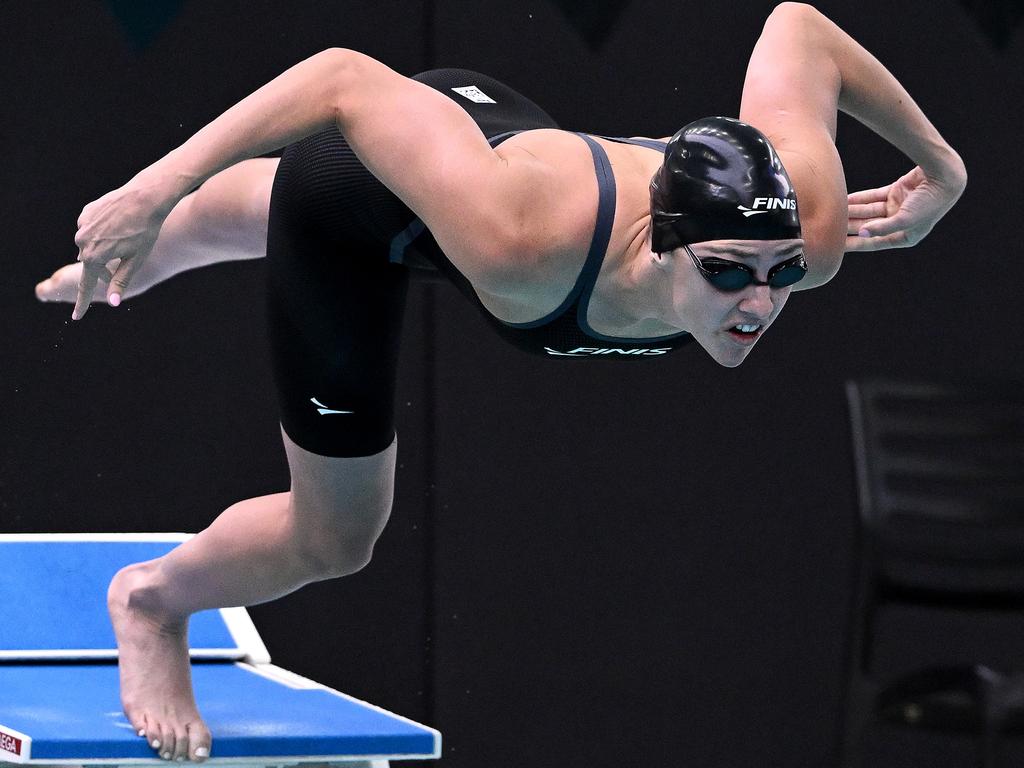
“I had to learn (to hear) the starting (gun),” she says. “It’s the only thing that’s really affected my swimming, everything else is fine, because you don’t need to hear to swim. But the start gun, I can hear it now, I have trained myself to hear it. I used to just go when everyone else did (but) my reaction was always so slow, because I was listening for it, waiting for it.
“Over the years, practising dives, practising my reaction, I’ve just learned to go when I can hear the gun. I can hear it when everyone is silent. There’s only been a handful of times I haven’t heard the gun – very commonly I don’t hear the whistle to get on the blocks, because everyone is talking, and ‘take your marks’ is a bit hit and miss too.”
Harris says every time she swims, her reaction time to the start sequence is better.
“You can kind of time it. When they blow the whistle, it’s usually a couple of seconds before they say ‘take your marks’ and around that time I start really listening for the noise. It’s meant to be quiet during that time, but people still yell out … but it’s always dead silent for the gun.”
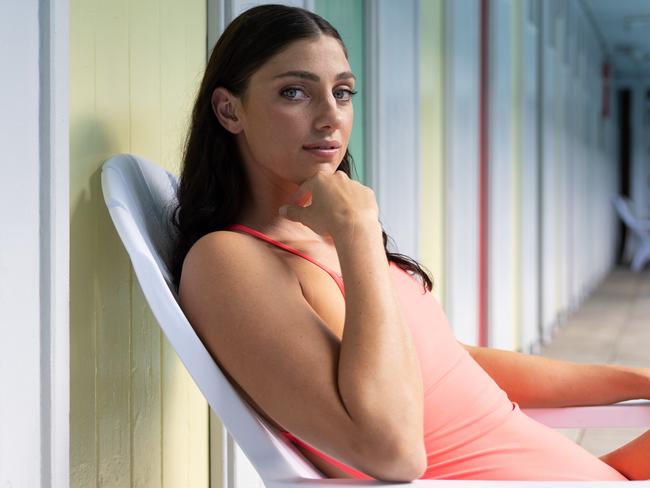
Harris says her hearing has had very little effect on her life, either on land or in the water.
“I’m pretty lucky, I’ve never been bullied about it, and it’s never held me back.” And if she ever does falter, she says, her teammates know when to step in.
“If I miss something, they’ll just hit me (lightly!) and tell me what to do, or they’ll repeat it. It’s not that they make a joke out of it, they just don’t make a big deal out of it.”
Which suits this brilliant young Australian swimmer just fine. Harris knows how to just get on with it, and when to dig deep – but she also knows when to ask for a helping hand, and wants other people to do the same.
“Well, the one thing I would say, my standby, is that no matter what – if it’s a hearing loss, if it’s something that you’re just not happy with, there’s always going to be someone, whether it’s your parents, whether it’s someone you’ve met along the way, in your sport – there’s gonna be someone who’s willing to help you get to where you want to be, even if its just to get started.”
She smiles her megawatt smile. “Just put your hand up, and ask for help. Someone will answer you.”
Videos courtesy of Finis Australia

Add your comment to this story
To join the conversation, please log in. Don't have an account? Register
Join the conversation, you are commenting as Logout
What a Beauty! Tricks and old-school magic make musical a must-see
Beauty and the Beast the musical has started what is certain to be a fairytale run at Adelaide Festival Theatre. Here’s what our reviewer made of the opening night performance.
Mullet over: Is your mum’s most hated hairstyle staying or mo-ing?
Love it or loathe it, the “mo and mullet” is making its mark but experts reveal a change could be on its way.